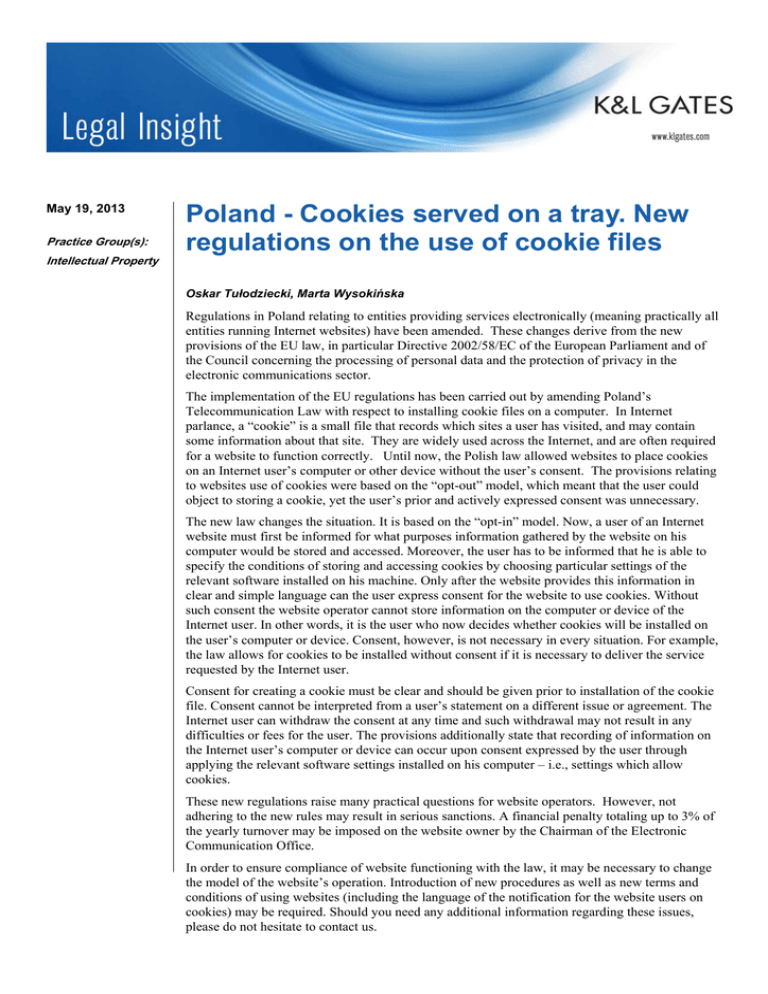
May 19, 2013
Practice Group(s):
Intellectual Property
Poland - Cookies served on a tray. New
regulations on the use of cookie files
Oskar Tułodziecki, Marta Wysokińska
Regulations in Poland relating to entities providing services electronically (meaning practically all
entities running Internet websites) have been amended. These changes derive from the new
provisions of the EU law, in particular Directive 2002/58/EC of the European Parliament and of
the Council concerning the processing of personal data and the protection of privacy in the
electronic communications sector.
The implementation of the EU regulations has been carried out by amending Poland’s
Telecommunication Law with respect to installing cookie files on a computer. In Internet
parlance, a “cookie” is a small file that records which sites a user has visited, and may contain
some information about that site. They are widely used across the Internet, and are often required
for a website to function correctly. Until now, the Polish law allowed websites to place cookies
on an Internet user’s computer or other device without the user’s consent. The provisions relating
to websites use of cookies were based on the “opt-out” model, which meant that the user could
object to storing a cookie, yet the user’s prior and actively expressed consent was unnecessary.
The new law changes the situation. It is based on the “opt-in” model. Now, a user of an Internet
website must first be informed for what purposes information gathered by the website on his
computer would be stored and accessed. Moreover, the user has to be informed that he is able to
specify the conditions of storing and accessing cookies by choosing particular settings of the
relevant software installed on his machine. Only after the website provides this information in
clear and simple language can the user express consent for the website to use cookies. Without
such consent the website operator cannot store information on the computer or device of the
Internet user. In other words, it is the user who now decides whether cookies will be installed on
the user’s computer or device. Consent, however, is not necessary in every situation. For example,
the law allows for cookies to be installed without consent if it is necessary to deliver the service
requested by the Internet user.
Consent for creating a cookie must be clear and should be given prior to installation of the cookie
file. Consent cannot be interpreted from a user’s statement on a different issue or agreement. The
Internet user can withdraw the consent at any time and such withdrawal may not result in any
difficulties or fees for the user. The provisions additionally state that recording of information on
the Internet user’s computer or device can occur upon consent expressed by the user through
applying the relevant software settings installed on his computer – i.e., settings which allow
cookies.
These new regulations raise many practical questions for website operators. However, not
adhering to the new rules may result in serious sanctions. A financial penalty totaling up to 3% of
the yearly turnover may be imposed on the website owner by the Chairman of the Electronic
Communication Office.
In order to ensure compliance of website functioning with the law, it may be necessary to change
the model of the website’s operation. Introduction of new procedures as well as new terms and
conditions of using websites (including the language of the notification for the website users on
cookies) may be required. Should you need any additional information regarding these issues,
please do not hesitate to contact us.
Poland - Cookies served on a tray. New regulations on
the use of cookie files
This publication is for informational purposes only and it should not be the basis of making any
binding decisions. The information contained herein concern only certain legal aspects of the
issues and cannot be treated as legal advice.
Authors:
Oskar Tułodziecki
oskar.tulodziecki@klgates.com
+48.22.653.4211
Marta Wysokińska
marta.wysokinska@klgates.com
+48.22.653.4210
Anchorage Austin Beijing Berlin Boston Brisbane Brussels Charleston Charlotte Chicago Dallas Doha Dubai Fort Worth Frankfurt
Harrisburg Hong Kong Houston London Los Angeles Melbourne Miami Milan Moscow Newark New York Orange County Palo Alto
Paris Perth Pittsburgh Portland Raleigh Research Triangle Park San Diego San Francisco São Paulo Seattle Seoul Shanghai
Singapore Spokane Sydney Taipei Tokyo Warsaw Washington, D.C. Wilmington
K&L Gates practices out of 48 fully integrated offices located in the United States, Asia, Australia, Europe, the
Middle East and South America and represents leading global corporations, growth and middle-market
companies, capital markets participants and entrepreneurs in every major industry group as well as public
sector entities, educational institutions, philanthropic organizations and individuals. For more information
about K&L Gates or its locations, practices and registrations, visit www.klgates.com.
This publication is for informational purposes and does not contain or convey legal advice. The information herein should not be used or relied upon
in regard to any particular facts or circumstances without first consulting a lawyer.
©2013 K&L Gates LLP. All Rights Reserved.
2






